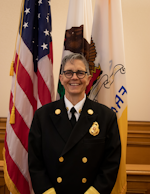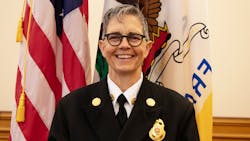Leadership Lessons: Assuming the Mantle: New Chiefs’ Top Five Concerns
Congratulations! You now are the chief of your department! This position can be rewarding and frustrating. It can be energy-inducing and energy-sapping. It can be fast-paced and a standstill. It takes a village to run a fire department, but sometimes it might feel as if you are all alone. Undoubtedly, there are things that you will wish that you knew prior to entering into the position.
Experience can be a difficult teacher for a fire chief, but it’s an honor and a privilege to be where you are, directing your department now and into the future.
Here are five things to prepare for when stepping up to this position.
Overwhelming workload
The amount of work that there will be to tackle is overwhelming. In fact, there likely will be so much work to do that you will find that you must prioritize your priorities. In addition, there will be a continual influx of information—and a lot of it.
You likely will have many good ideas, plans and strategies, but you can’t do everything that’s in front of you at once. Pace yourself and temper your expectations. I write this despite knowing that, in the fire service, we are great at taking action and getting things done. That is the nature of our profession. However, unfortunately, you will find that some things take an exceedingly long time to gain traction, let alone come to fruition. The amount of work and varying obstacles that impede your progress can be frustrating and disappointing.
Some days you might feel as if you only can tread water, but before you know it, things move forward. The issue that was so challenging three months ago is resolved. However, it has been replaced—by another new issue, or two, or three. Don’t despair. Keep moving forward and doing the work.
Internal comms/relationships
Our common mission forges bonds of trust, mutual support and interdependence. These bonds are fortified over years of working and living together. However, now, you work at a level where you regularly make decisions that will affect these relationships. Inevitably, some people won’t like nor understand your point of view.
Be prepared for pushback and disagreement from various stakeholders, including longtime colleagues and friends. If you take any of this personally, you will get sidetracked and waste valuable time and energy.
Strive to develop a proactive practice of maintaining and growing your relationships. Schedule regular meetings with stakeholders. This can include the organization that represents your members as well as affinity groups, such as associations of black firefighters, women firefighters and EMS officers.
Ensure that you and your command staff make time to communicate with the boots on the ground. Morale is real. Your presence and interest are felt when you show up at a firehouse or EMS station and listen to members’ concerns while you socialize and develop rapport. It doesn’t take a lot of effort to express gratitude to the people who do the work or to inform them of some of your projects and priorities. You likely will learn valuable information from your troops. Furthermore, this kind of face-to-face contact in real time can clear up, or even preempt, misconceptions.
Setting priorities
If your department has a strategic plan, you must understand it and make it your own. If not, you must create one. What are your 100-day, one-year and five-year visions? Be prepared to present your short-, medium- and long-term priorities with all of the members of your team. Give them specific, measurable, and attainable goals and time frames.
Make sure to conduct internal meetings with your command staff and the subject matter experts who are in your department. Create committees and workgroups and be certain to include interested members and to empower them by soliciting their active participation.
Connect with organized labor. There will be times that you won’t agree, but you must find common ground and collaborate on shared goals. If each of you go to city officials with different priorities and ideas, it will work against you. A functional labor management relationship is optimal for the health of your department.
Political relationships
You must understand the political landscape of your town, city or county. If you don’t, you are likely to step into landmine after landmine and thwart your goals.
As is the case with your staff, relationships on the political level are critical. Meet with your local elected and appointed officials and learn about their needs and goals. Assess how their priorities overlap or conflict with those of your department.
Like it or not, your role is political, and you must navigate challenging political waters with grace and diplomacy while still carrying out the department mission. Your department will be stronger and better resourced for this collaboration with city officials. However, there will be times when things won’t go your way. There will be backroom deals that could affect the department negatively. Understand what type of bias or preconceived notions that politicians and others who are in a position of power have about your department. You might need to rehabilitate your department’s reputation even if the perception is incorrect. And again, take nothing personally.
Daily challenges
Check your ego at the door. You will make mistakes. We all do. Own them, learn from them and move on. You aren’t your latest triumph nor your most recent failure. It’s the totality of what you do that matters.
There always will be daily challenges. Over the long run, you must keep your eye on the mission. You must drive the purpose of the department for the greater good. Don’t forget why you are where you are. One foot in front of the other, and one day at a time, and do the next right thing.
Building and maintaining your own storage of resilience is paramount to your success. You can’t do anything for others if you aren’t on an even keel. Dedicate yourself to making the time to do the things that you must do to care for yourself. Proper sleep, exercise and diet are a good start. Religious, family and community connections might be what help you. Whatever it is, carve out time for yourself. No one can run a marathon without replenishing themselves.
There are pitfalls in every promotional rank in the fire service. The fire service is filled with people who are good at finding solutions and workarounds to the issues that arise. Put the right people in the right places and empower them. Trust, but verify. Grow relationships internally and externally. Learn from successes and failures. Carry the vision and the hope for your department. Keep your eye on the prize.

Jeanine Nicholson
Jeanine Nicholson is the chief of the San Francisco Fire Department (SFFD). She began her career with the SFFD in 1994 as a firefighter EMT. Nicholson promoted through the ranks of firefighter paramedic, lieutenant, captain and battalion chief. In 2018, she was appointed deputy chief of administration and oversaw numerous divisions. Nicholson is a member of the California Fire Chiefs Association and California Metropolitan Fire Chiefs Association and sits on the board of directors of Firescope (Firefighting Resources of California Organized for Potential Emergencies). She is a breast cancer survivor and served on the board of the San Francisco Firefighters Cancer Prevention Foundation. Nicholson holds a bachelor’s degree in sociology and anthropology from Colgate University. Under her leadership, SFFD’s Street Crisis Response Team and Diversity, Equity & Inclusion Office came about.






